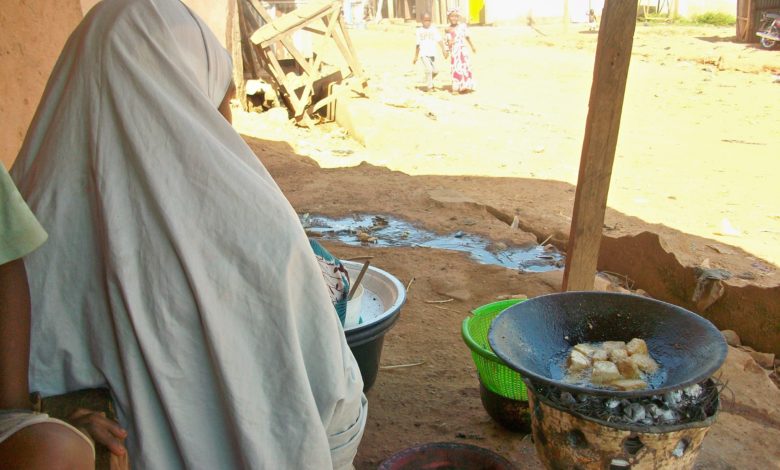17-Year-Old Girl, Orphaned, Turn Breadwinner

Sadiqa Sanusi, a teenager in Kaduna, Northwest Nigeria, had to fill the gap created by the demise of her father in supporting her family. Her mother could not do it alone. But this role, especially because she is female, comes with ups and downs.
The 17-year-old girl fries soybean cake, popularly known as awara, every day to help her mother cater to their large family of 10.
A day without making such an outing affects the family’s needs for food, healthcare and sanitary support.
Orphaned in the middle of 2020 when the cold hands of death snatched her father, the future became blurry for Sadiqa and her eight siblings.
The financial impact of her father’s death was not felt much as schools were on the COVID-19 break. In order to help her mother, Sadiqa began to fry awara in front of her house every day starting from around 10 a.m. till late afternoon.
She makes about N2,500 on a good day. On other days, she makes a little above N1,000. Her three brothers, who work as apprentices in a furniture workshop, also help with the little money they sometimes get. Out of this money, her mother buys some foodstuff on market days every Tuesday. With the rest, she buys more ingredients for the business and saves the remaining.
The impact of the COVID-19 on prices of foodstuff has made feeding almost impossible for the family. According to the National Bureau of Statistics (NBS), the number of unemployed people in Nigeria spiked to 21.8 million due to the pandemic, with a 15.8 per cent drop in the number of people with decent jobs. The country’s economy also contracted by 6.1 per cent in the second quarter, the lowest in a decade.
“As with most other economies around the world, the sharp drop in Nigeria’s GDP growth is largely down to the slowdown in economic activity after the country resorted to a lockdown back in April to curb the spread of the virus,” observed researcher, Yomi Kazeem.
For Sadiqa, thoughts of how her family would survive keep her busy. As the first child, she is saddled with the responsibility of supporting her uneducated mother to provide food and education for herself and her siblings.
Now that schools are resuming, Sadiqa wakes up and sleeps with thoughts of how her mother would cope with paying her siblings’ school fees.
As if the situation is not bad enough, Sadiqa’s paternal relatives who have not contributed a dime to help her widowed mother are pressuring her to get married, she being the first child.
The situation at hand makes her a vulnerable target to preying men who would like to take advantage of her situation by marrying her in exchange for some cash.
“One particular alhaji went through the imam of our mosque to request for my hands in marriage as his fourth wife, together they came to greet my mum last night with some provisions,” she said.
Men old enough to be her father now dangle money at her in order to woo her to marry them.
“I want to further my education and become a nurse, but with the situation at hand, many people are pressuring my mother about marrying me and very soon she might have to give in to their request,” Sadiqa said.
Her circumstances make her a target of some men who are predators who feast on innocent, vulnerable teenagers like her.
“I would like any kind of support to make my life meaningful and those of my family and my community,” she said.
Her story is not one in a million but is typical in her environment. According to the NBS Poverty and Inequality report of 2019, Kaduna has a poverty headcount rate of 43.5 per cent, just above the national average. Nearly 40 per cent of children of school age in the northwest are not enrolled in school, the United Nations Children’s Fund (UNICEF) said in 2019, and the figures are even more gloomy when the focus is placed on girls.
For Sadiqa whose dream is to become a nurse and financially support her mother, the future remains bleak as she might be forced to give up her schooling due to lack of sponsorship and pressure from her family to get married.
Support Our Journalism
There are millions of ordinary people affected by conflict in Africa whose stories are missing in the mainstream media. HumAngle is determined to tell those challenging and under-reported stories, hoping that the people impacted by these conflicts will find the safety and security they deserve.
To ensure that we continue to provide public service coverage, we have a small favour to ask you. We want you to be part of our journalistic endeavour by contributing a token to us.
Your donation will further promote a robust, free, and independent media.
Donate HereStay Closer To The Stories That Matter




